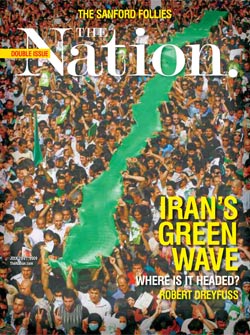 An article by Robert Dreyfuss explores the division among the Iranian political elite that has contributed to the recent mass demonstrations there. Dreyfuss convinces me that the government has a narrow base of support among elite groups in the city of Teheran. Most of the people he talks to regard Ayatollah Khamenei and President Ahmedinejad as too hard-line and traditionalist, while many others are turning to rightist groups that accuse those men of being too soft. However, I’m skeptical of Dreyfuss’ attempts to suggest that the Teherani elite is in this matter representative of the country as a whole. Dreyfuss cites the Chatham House study which compared voter turnout in Iran’s 2005 presidential election with turnout in this year’s contest, concluding that the number of votes reported had increased by so much that fraud was a likelier explanation than was a rise in actual participation. On Dreyfuss’ own showing, though, the opposition has the support of many key power players. Among them are many men who may be in a position to falsify votes. And the fact remains that the only opinion poll conducted in Iran before this year’s election predicted the same result that the authorities certified. The election may well have been a phony, but Dreyfuss definitely wrong to say that it “seems far-fetched” to think that Ahmedinejad may have won.
An article by Robert Dreyfuss explores the division among the Iranian political elite that has contributed to the recent mass demonstrations there. Dreyfuss convinces me that the government has a narrow base of support among elite groups in the city of Teheran. Most of the people he talks to regard Ayatollah Khamenei and President Ahmedinejad as too hard-line and traditionalist, while many others are turning to rightist groups that accuse those men of being too soft. However, I’m skeptical of Dreyfuss’ attempts to suggest that the Teherani elite is in this matter representative of the country as a whole. Dreyfuss cites the Chatham House study which compared voter turnout in Iran’s 2005 presidential election with turnout in this year’s contest, concluding that the number of votes reported had increased by so much that fraud was a likelier explanation than was a rise in actual participation. On Dreyfuss’ own showing, though, the opposition has the support of many key power players. Among them are many men who may be in a position to falsify votes. And the fact remains that the only opinion poll conducted in Iran before this year’s election predicted the same result that the authorities certified. The election may well have been a phony, but Dreyfuss definitely wrong to say that it “seems far-fetched” to think that Ahmedinejad may have won.
A reissue of William Appleman Williams’ The Tragedy of American Diplomacy prompts an appreciation of Williams’ work. Williams work is characterized as a reinterpretation of Frederick Jackson Turner’s famous thesis about the role of the frontier in American history. For Williams, the frontier was not the boundary between land already claimed by Americans as their property and that claimed only by nomadic tribes who did not regard land as something that could be owned. Nor did the frontier close in 1890. Instead, the frontier was ever present, always manifested in whatever territory American imperialism might turn to next. Williams systematically erased the distinctions historians had made between the westward expansion of Americans into native territory and the imperial expansion of American power into territory controlled by other nation-states. For him, all expansion had as its goal the creation of a “surplus social space” which could be used as a valve to release social pressures that might otherwise threaten the power elite.
Two pieces deal with South Carolina’s lovelorn Governor Mark Sanford, one solemnly accusing him of lacking empathy for the poor folks who might get jobs if various spending programs he has opposed were implemented, another pointing out that the greatest hypocrites in this matter are the reporters who claim that it pains them to publish details of and speculation about the governor’s sex life. Even the accusing piece concedes that Sanford has never been a morality campaigner, and that when he was a congressman he had an actual antiwar record. I’ve been drawn into discussions about Governor Sanford at both Dykes to Watch Out For and Language Log; I’m glad I’m not the only person outside of the Republican Party who sees some good in the guy.
No comments:
Post a Comment